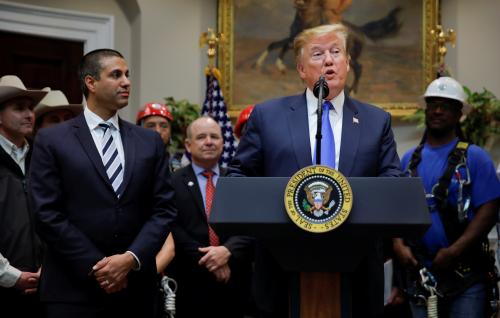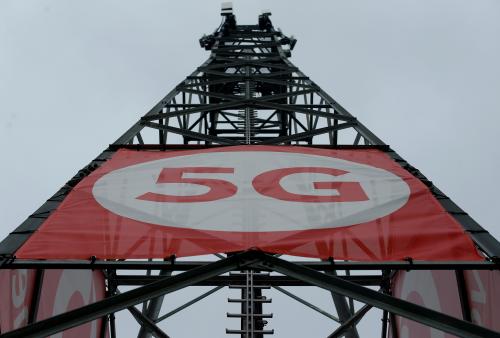The collision of corporate opportunism and Republican anti-government orthodoxy has pushed the United States backwards on the allocation of important spectrum for fifth generation wireless networks (5G). Positioning the U.S. as engaged in no-holds-barred competition with China, President Trump declared in April, “The race to 5G is on and we must win.” With typical bravura, he then promised, “my administration is freeing up as much wireless spectrum as is needed.”
Unfortunately, such is not the case when it comes to the most desired piece of 5G spectrum. Thanks to the Trump Federal Communications Commission (FCC), the effort to free up a large and important piece of 5G spectrum known as C-Band is farther behind at the end of 2019 than it was at the beginning of the year.
A phone call
Part of that regression stems from a phone call from the president to the FCC Chairman Ajit Pai. Immediately after the call, the chairman reversed plans to allocate this important piece of spectrum for 5G. The result is to make the path to 5G spectrum longer, not shorter.
“I’m optimistic that we’ll have results to show on this [C-Band] front this fall,” Chairman Pai told a gathering Sept. 24. That all changed on Oct. 30 when President Trump called the Chairman to question his plans.
Until the president’s call, the FCC appeared to favor allowing licensee satellite companies to behave as if they owned the spectrum. The Republican majority on the FCC seemed headed towards outsourcing the sale of the public’s airwaves to a private transaction run by the satellite companies for their own profit.
Historically, the sale of licenses has been handled by the FCC through a public auction. The proceeds of the auction then went to the owners of the spectrum, American taxpayers, via deposits in the U.S. Treasury. Reportedly, the president was upset with how the FCC planned to outsource the sale of spectrum to the satellite licensees, since it meant that four foreign companies would receive windfall profits from selling spectrum owned by American taxpayers. The result was to further delay an already overly long FCC process to free C-Band spectrum for 5G.
A long delay
18 months have passed since when the Trump FCC first proposed using the C-Band for 5G in July 2018. Typically, that is enough time for the FCC to establish the rules for the repurposing of the spectrum from satellite to 5G use and start the auction. Had the FCC followed its usual procedures, a 5G auction would have begun by now.
The delay in the C-Band auction is the result of the satellite licensees seeing a get-rich-quick opportunity and packaging it as consistent with Republican political orthodoxy. The companies that were using C-Band to deliver video via satellite realized that new technology and changing business realities meant they didn’t need all their allocated spectrum. They banded together with an offer to speedily repurpose the spectrum if the Trump FCC would allow them to keep the proceeds of the sale, even though the asset wasn’t theirs.
In brilliant positioning designed to appeal to Republican instincts, they branded this as a “marketplace solution.” The Republicans at the Trump FCC took the bait. Apparently, they assumed that if it wasn’t a government-run sale, then surely it must be a “marketplace” solution. Of course, a true marketplace is the kind of open and transparent auction the FCC has run over one hundred times.
But the president’s call to Chairman Pai put an end to the outsourcing of the FCC’s job and the exporting of the taxpayers’ money. With this reversal, the FCC must now go back and perform the basic tasks of any FCC-led auction—many of which, until the phone call, were being outsourced to the satellite companies.
Lingering policy decisions
We will probably see the beginnings of the Trump FCC’s recovery plan when the Commission next meets on January 30. No doubt there will be much fanfare and back-patting about the reallocation of a large piece of spectrum. But it’s a long way from that decision to a 5G auction, and even longer until the spectrum is put into service. Before there can be an auction, the Commission will have to deal with policy issues that thus far it has chosen to ignore.
Running the auction itself is no mean feat, but it is the easiest part of a spectrum auction. The FCC has conducted many auctions and has a highly competent and skillful auction staff. The hardest part of a spectrum auction is determining what will be auctioned, specifically the rules that will govern the use of the spectrum.
Behind every spectrum auction are a myriad of policy decisions the FCC has yet to make. These decisions can be mind-numbing in their complexity and have non-trivial political implications. For instance, what will be the rules under which the auction will operate? These include who is eligible to bid, how so-called Designated Entities will be treated, how to prevent one company from buying up all the spectrum and choking off competition. What will be the technical and service rules for the new licensees? These include power limits, allowable out-of-band emissions and build-out schedules? Most importantly, what are the rules that will govern the physical transition of the spectrum from serving satellite earth stations to serving 5G networks?
A large part of what the FCC will have to do after its big January announcement is to build a record that helps them make these policy decisions. Engineering studies will be presented by various parties at interest. Economic analysis will accompany advocacy as various parties jockey for an advantageous position. It probably will not be until the spring before all the input has been received, analyzed, and the chairman can put forward a proposed policy.
Waiting until Spring 2020 means that more time will have been lost to answer questions that should have been answered months ago.
A question of compensation
Hidden amidst the technical details of the auction is probably the biggest conundrum of all. Having lost the opportunity for a cash windfall from a private transaction, the satellite companies are now arguing that they need cash incentives to speedily vacate their spectrum. The chairman must decide whether to offer an incentive, and if so, how much to offer. On the one hand, Section 316 of the Communications Act gives the Commission authority to modify any license, “if in the judgment of the Commission such action will promote the public interest.” This sweeping power is tempered, however, by the need for companies’ help with a speedy transition. In typical Washington-speak, “speed” is a code word for “cooperation” from the satellite companies in exchange for “compensation”.
Congress has sent the chairman conflicting signals regarding incentive payments. The Republicans on the Senate Commerce Committee passed a bill on a party line vote instructing the FCC to pay half of the first $40 billion to the satellite licensees with graduated, declining percentages for receipts beyond $40 billion. The House Democrats are reportedly considering their own legislation—akin to what Democrats proposed in the Senate—with a significantly lower payment (maybe even zero) to the satellite licensees. The FCC, however, does not require any legislation to move forward on the C-Band auction.
So, once again, we wait. Most likely, it will be spring before the FCC makes the necessary decisions for the auction to proceed. The “race to 5G” and the opening of C-Band spectrum will, by then, have spent two years treading water.
The Brookings Institution is committed to quality, independence, and impact.
We are supported by a diverse array of funders. In line with our values and policies, each Brookings publication represents the sole views of its author(s).











Commentary
Going backwards in the ‘race for 5G’
December 20, 2019